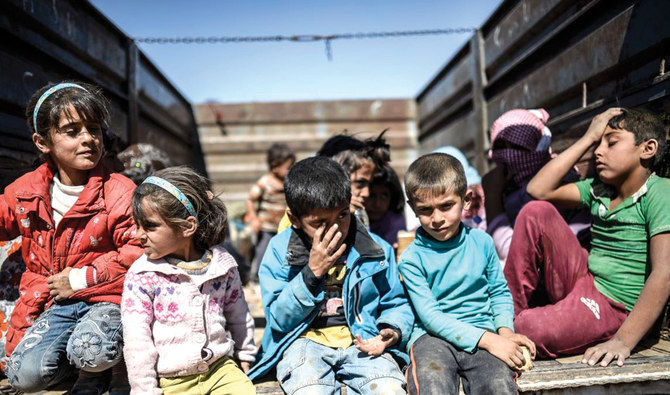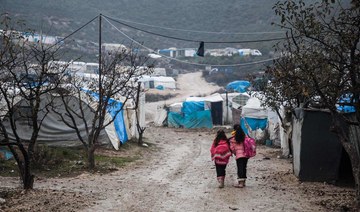ANKARA: Turkey will warn Russian President Vladimir Putin that escalating fighting in Syria’s Idlib province could threaten the country with a flood of Syrian refugees.
Escalating fighting in the nearby province is likely to be a major focal point of talks between Turkish President Recep Tayyip Erdogan and Putin during the Russian leader’s visit to Turkey on Jan. 8.
Erdogan last week warned Europe that Turkey cannot handle a new wave of Syrian refugees fleeing increased bombardment in Idlib. The country already has more than 3.7 million registered Syrian refugees.
More than 80,000 Syrians have fled toward the Turkish border in the past week following a Syrian regime offensive backed by Russian airpower in the Maaret Al-Numan region.
Turkey’s leader told Europe to prepare for a “new wave” of Syrian refugees, saying his country “will not carry the migration burden alone.”
The Syrian offensive is part of Bashar Assad’s strategy to secure the M4 and M5 highways running through Idlib, both key routes connecting the government-controlled cities of Aleppo and Hama with the rest of the country.
“Idlib is the last stronghold of the rebels and extremists, all opponents of the Assad regime,” Sinan Hatahet, an Istanbul-based Syrian analyst, told Arab News.
“For the stability and survival of the Syrian regime, it is important Assad completely destroys it,” he added. The province is already home to about 3 million people, including many displaced from other parts of Syria.
Hatahet warned that rebels linked with Al-Qaeda could pose a risk of future insurgency in the province. He said that from a Russian perspective, the humanitarian crisis in Idlib offers the Kremlin leverage in its negotiations with Ankara, Brussels and Washington.
Turkey has backed Syrian rebels fighting to oust Assad, while Moscow and Tehran support the regime. A senior Turkish delegation traveled to Moscow on Dec. 23 to discuss the escalating fighting in Syria.
Turkey recently reinforced 12 military observation posts along the border of Idlib following attacks that resulted in the death and injury of its soldiers.
The observation points were established following a September 2018 deal between Russia and Turkey aimed at preventing a regime assault against the rebels. However, the Damascus regime continued its bombardment despite the cease-fire agreement.
FASTFACT
Last Saturday, Russia and China vetoed a UN Security Council resolution on allowing cross-border humanitarian aid to Syria.
“Turkish observation points do not have a tactical and functional presence anymore because their original objective — observing any regime breach of the cease-fire — failed. It is only a matter of time before Turkey withdraws these posts,” Hatahet said.
Syrian regime forces surrounded a Turkish observation post in Al-Surman on Monday, but there were no clashes.
Navvar Saban, a military analyst at the Omran Center for Strategic Studies in Istanbul, said that the Russian military escalation in Idlib shows Moscow is determined to achieve its goals.
Saban said that the latest attacks by the regime and Russia are targeting civilians and some rebel groups while ignoring the presence of Al-Qaeda-linked extremists.
“What happens now is an initial attack for an upcoming operation in Syria,” he told Arab News. “There are different scenarios, but the most likely one is that the Russians will take control of the M4 and M5 highways, and won’t care about the rest of the area.”
Last Saturday, Russia and China vetoed a UN Security Council resolution on allowing cross-border humanitarian aid to Syria.
The resolution would have extended for one year all cross-border UN-funded aid distributions from Turkey and Iraq to millions of Syrian civilians, especially those in Idlib region and other opposition-held areas of Syria.














